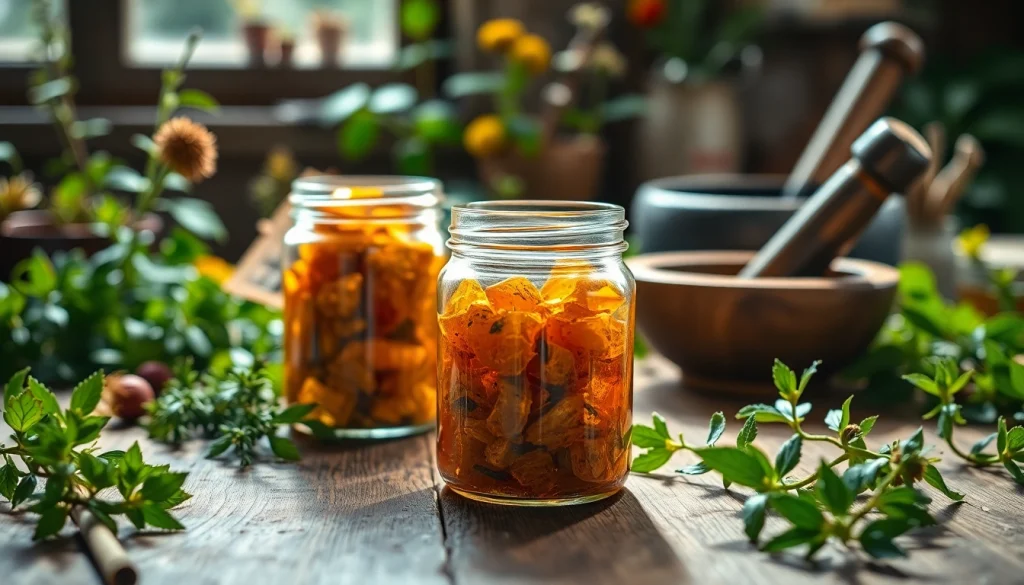Understanding Benjoin: Applications, Benefits, and Uses in Herbal Medicine

What is Benjoin? Overview and Origins
Benjoin, often referred to as benzoin, is a fragrant resin derived from the bark of the Styrax tree, mainly found in Southeast Asia. Its rich scent and various applications have made it a significant substance in different cultures over the centuries. The resin has not only been valued for its aromatic properties but has also found its place in traditional medicine and modern herbal practices. Benjoin is recognized for its diverse range of health benefits, including its antimicrobial and anti-inflammatory effects, which contribute to its ongoing popularity in holistic health circles.
1. Historical Uses of Benjoin
The history of benjoin traces back to ancient civilizations, where it was utilized for its medicinal and aromatic properties. The earliest records indicate its use in Egypt, where it was burned as incense during religious ceremonies and funerary rites. Its soothing scent was believed to ward off evil spirits and provide comfort to the deceased on their journey to the afterlife.
In traditional Chinese medicine, benjoin has been equally significant. It has been used in various remedies for respiratory issues, skin conditions, and digestive problems. Furthermore, its use in perfumery has roots that go back thousands of years, with references found in Greek and Roman texts, highlighting its scent as a luxury ingredient in cosmetics and fragrances.
2. Sources and Types of Benjoin
Benjoin is primarily sourced from two plants: Styrax benzoin and Styrax tonkinensis. The resin is collected by incising the bark of these trees, allowing the sap to ooze out and harden. The two main types of benjoin are Sumatra and Siam, distinguished by their geographic origins and slight variations in aroma and chemical composition. Sumatra benjoin tends to have a sweeter and richer fragrance, while Siam benjoin is characterized by a more balsamic note.
In addition to being used as incense, these resins have found their way into various personal care products, including lotions, oils, and soaps, owing to their beneficial properties and aromatic qualities.
3. Chemical Composition and Properties
The chemical composition of benjoin resin is complex, containing compounds such as benzoic acid, vanillin, and various essential oils. These constituents contribute not only to its distinctive scent but also to its therapeutic properties. The presence of benzoic acid lends benjoin its antifungal and antiseptic qualities, making it effective in treating minor wounds and skin irritations.
Additionally, the aromatic properties of benjoin are attributed to its essential oil content, which can vary depending on the source. This diverse chemical makeup is what allows benjoin to have applications in everything from aromatherapy to culinary practices.
Benefits of Benjoin in Herbal Practices
1. Therapeutic Effects on the Body
Benjoin is celebrated for its therapeutic effects, useful in treating a plethora of ailments. Its anti-inflammatory properties can help reduce swelling and pain associated with conditions like arthritis and muscle injuries. When utilized in herbal practices, benjoin is often combined with other healing herbs for enhanced effects.
Furthermore, its expectorant properties make it a valuable ally for respiratory health. Benjoin has been used in traditional remedies for coughs, bronchitis, and asthma, providing relief and facilitating easier breathing.
2. Spiritual and Aromatic Benefits
Beyond its physical health benefits, benjoin has been an integral component in spiritual practices throughout history. Its calming and grounding scent is often used in meditation, yoga, and spiritual cleansing rituals. The act of burning benjoin resin is believed to create a sacred atmosphere, fostering a sense of peace and tranquility.
In modern aromatherapy, benjoin is utilized to alleviate stress and anxiety, often blended with other essential oils to enhance emotional well-being. Its warm and sweet aroma is conducive to relaxation, making it a popular choice for diffusers and massage oils.
3. Antimicrobial and Antioxidant Properties
The antimicrobial properties of benjoin have been supported by various studies, indicating its effectiveness against certain bacteria and fungi. This makes benjoin a great addition to natural cleaning products and skincare formulations, aiding in the prevention of infections and promoting overall skin health.
Moreover, the antioxidant properties of benjoin play a crucial role in fighting free radicals in the body. By combatting oxidative stress, benjoin can help in reducing the risk of chronic diseases and promoting longevity.
How to Use Benjoin: Methods and Techniques
1. Incorporating Benjoin into Aromatherapy
Incorporating benjoin into aromatherapy is a straightforward process that can enhance any relaxation practice. Benjoin essential oil can be added to diffusers, allowing its soothing aroma to permeate the space. Alternately, a few drops can be mixed with carrier oils for massages, benefiting both body and mind.
Creating calming blends can be achieved by combining benjoin oil with other essential oils like lavender or frankincense, enhancing therapeutic effects and creating a personalized aromatic experience.
2. Culinary Uses of Benjoin
While less common than other culinary herbs, benjoin can be used in cooking to impart unique flavors, particularly in sweet dishes. Its flavor profile, with mildly sweet and fragrant notes, complements desserts like cakes and candies. Care should be taken when using benjoin in culinary applications, as its potency requires minimal amounts to achieve the desired flavor without overwhelming other ingredients.
In traditional practices, benjoin has also been used to flavor beverages, offering an exotic twist in teas and herbal infusions.
3. Crafting Herbal Remedies with Benjoin
Benjoin can serve as a powerful ingredient in homemade herbal remedies. When preparing tinctures, for instance, combining benjoin with alcohol or glycerin can create a potent extract suitable for various health applications. This tincture can then be used to treat skin irritations, respiratory issues, or even digestive discomfort.
In addition, creating salves with benjoin, beeswax, and carrier oils can provide a soothing balm effective for cuts, scrapes, or moisturizing dry skin.
Potential Risks and Considerations with Benjoin
1. Allergies and Reactions
Despite its many benefits, some individuals may experience allergic reactions to benjoin. Skin sensitivities can manifest as redness, itching, or irritation when using benjoin-infused products. Performing a patch test prior to widespread use is advisable to ensure compatibility.
Additionally, those with respiratory conditions should be cautious, as the inhalation of benjoin smoke or vapor may trigger symptoms in sensitive individuals.
2. Proper Dosage Guidelines
When utilizing benjoin in any form, adhering to proper dosage guidelines is essential for safety. Generally, for essential oil use, a few drops diluted in carrier oil suffices for topical applications. For internal uses, particularly edible preparations, consulting a herbalist or healthcare provider is recommended to avoid adverse effects.
Regular monitoring of one’s reaction to benjoin products is crucial. If any adverse sign appears, discontinuation and consultation with a healthcare professional are advised.
3. Interactions with Other Herbs or Medications
As with any herbal remedy, benjoin may interact with other herbs and medications. For instance, those on anticoagulant medications should exercise caution, as benjoin’s properties can affect bleeding time. Additionally, combining benjoin with other strong herbs may amplify effects, leading to unforeseen reactions.
Consulting with a healthcare professional familiar with herbal interactions is advisable before beginning any benjoin regimen, particularly for those with chronic conditions or on medication.
Future of Benjoin in Herbal Medicine and Research
1. Emerging Studies and Discoveries
The future of benjoin in herbal medicine looks promising, with ongoing research exploring its full potential. Emerging studies are focusing on its properties, particularly in relation to its antimicrobial and anti-inflammatory effects. As the wellness industry continues to grow, interest in natural and plant-based remedies will likely propel further exploration of benjoin.
New applications, perhaps even as a key ingredient in modern pharmaceuticals, may come to light as researchers delve deeper into its chemical composition and health benefits.
2. Sustainability and Ethical Sourcing
As demand for natural products rises, the sustainable sourcing of benjoin is becoming increasingly important. Overharvesting of Styrax trees poses significant risks to their populations and the ecosystems in which they thrive. Sustainable harvesting practices and ethical sourcing are essential to ensure that benjoin can be enjoyed for generations to come.
Supporting producers who engage in responsible harvesting can help maintain biodiversity while still tapping into the benefits of this remarkable resin.
3. Community Use and Education Programs
Incorporating benjoin into community health and education programs can serve to enhance awareness and appreciation of this natural resource. Workshops, seminars, and training sessions can enable individuals to learn how to use benjoin effectively in wellness practices, boosting local culture surrounding herbal medicine.
By empowering communities with knowledge on the benefits, uses, and sustainability of benjoin, a culture of appreciation and responsible use can thrive, ensuring its preservation for future generations.







